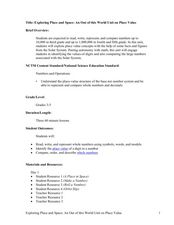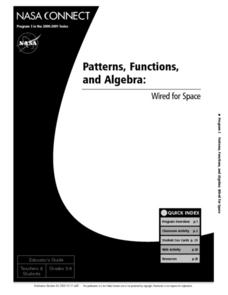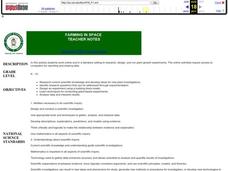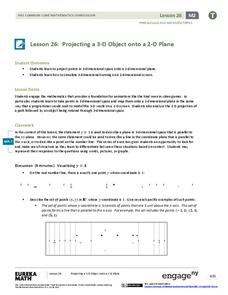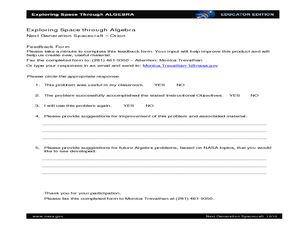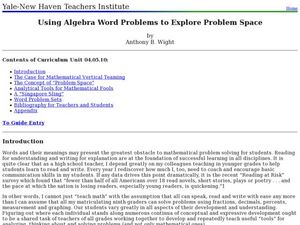Curated OER
Destination Outer Space
Students investigate space travel. In this space travel lesson plan students examine space exploration history, engineers and scientists involved in space exploration, and Newton's third law of motion. Students make rockets.
EngageNY
Solving Equations Involving Linear Transformations of the Coordinate Space
Explore methods for solving linear systems with your classes and introduce learners to using matrices as a viable method. Scholars are able to recognize situations where matrices are the efficient method of solving. Application...
EngageNY
Coordinates of Points in Space
Combine vectors and matrices to describe transformations in space. Class members create visual representations of the addition of ordered pairs to discover the resulting parallelogram. They also examine the graphical representation...
Curated OER
Exploring Place and Space
Students explore number values by completing mathematical worksheets in class. In this decimals lesson, students identify the different place values a number has and the use of decimals to represent a fraction of a number. Students...
EngageNY
Composition of Linear Transformations 2
Scholars take transformations from the second to the third dimension as they extend their thinking of transformations to include three-dimensional figures. They explore how to use matrices to represent compositions of...
PHET
Earth’s Magnetic Field from Space
Feel the pull of science! The final installment of this 18-part series is an application of everything learned in the previous high school lessons. Scholars are given a magnetic field map and must propose an arrangement of magnets that...
Curated OER
Patterns, Functions, and Algebra: Wired for Space
Young scholars assess how patterns, functions and algebra can assist NASA engineers design new ways of propelling spacecrafts. They explore how electricity and magnetism are replacing the fuel-consuming rocket propulsion....
Alabama Learning Exchange
Can Plants Be Grown in Space?
Students investigate finding a solution to growing plants in space. They define key vocabulary terms, conduct an experiment growing plants, explore various websites, and participate in a live video conference with NASA regarding the...
Curated OER
Farming in Space
Students research, design, and run plant growth experiments online. They explore websites, design an experiment using an animation-based building block program, construct a soda bottle hydroponic production unit and a cardboard plant...
Curated OER
Using Technology to Represent Mathematical Identities
Students explore the concept of trig identities. In this trig identity lesson plan, students use Mathematica to graph trig identities. Students see the trig identities graphically and enforce the notion that two trig functions can be...
EngageNY
Using Sample Data to Estimate a Population Characteristic
How many of the pupils at your school think selling soda would be a good idea? Show learners how to develop a study to answer questions like these! The instructional activity explores the meaning of a population versus a sample and how...
NASA
Food For Thought
Science can be quite tasty. A delectable unit from NASA shows learners why it's important to consider food, nutrition, and health in space. Four lessons explore the idea in great depth, including testing cookie recipes. Along the way,...
EngageNY
Projecting a 3-D Object onto a 2-D Plane
Teach how graphic designers can use mathematics to represent three-dimensional movement on a two-dimensional television surface. Pupils use matrices, vectors, and transformations to model rotational movement. Their exploration involves...
EngageNY
First-Person Computer Games
How do graphic designers project three-dimensional images onto two-dimensional spaces? Scholars connect their learning of matrix transformations to graphic design. They understand how to apply matrix transformations to make...
NASA
Next Generation Spacecraft - Orion
Emergine space engineers discover the area of complex geometric shapes. They find that, just as a spacecraft is composed of many smaller parts, so can polygons be broken into smaller shapes.
NASA
Exploring Data
Bring the sun to your class! Young scholars analyze actual solar wind data in the second lesson of a five-part series. Their analysis includes speed, temperature, and density data.
Curated OER
Geometry In Space
Students Fulfill the requirements of Texas Standards as it relates to math and science. In this circle lesson, students identify the arcs and angles of a circle as it relates to Pi. They solve real life scenarios using space as an example.
Curated OER
Earth From Space
Students watch a series of programs from NASA titled "Earth From Space". After viewing the program, they identify ways NASA is researching the reasons why the Earth is changing. They discuss the various levels of the atmosphere and...
NASA
Collecting Light: Inverse Square Law Demo
Light, distance, and mathematics come together to help scientists plan for space missions. Groups examine the relationship between distance from the sun and light availability in a hands-on exploration activity. They model the inverse...
American Statistical Association
A Sweet Task
Candy is always an effective motivator! A fun math activity uses M&M's and Skittles to explore two-way frequency tables and conditional probability. The candy can serve a dual purpose as manipulatives and experimental data.
Curated OER
Using Algebra to Explore Problem Space
Students apply their knowledge of math by rewriting word problems using equations. In this word problem lesson, students build upon previous knowledge as they set up the correct steps to solve word problems. This lesson is full of hints...
EngageNY
Discrete Random Variables
You don't need to be discreet about using the resource on discrete variables. In the fifth installment of a 21-part module, scholars explore random variables and learn to distinguish between discrete and continuous random variables. They...
Space Awareness
Oceans on the Rise
Temperature rises and land disappears! Through a lab exploration, learners understand the effect of temperature increase on water similar to the effect of global warming on our oceans. As they heat the water in a flask, they measure the...
EngageNY
Choice of Unit
Explore using units with scientific notation to communicate numbers effectively. Individuals choose appropriate units to express numbers in a real-life situation. In this 13th lesson of 15, participants convert numbers in scientific...



